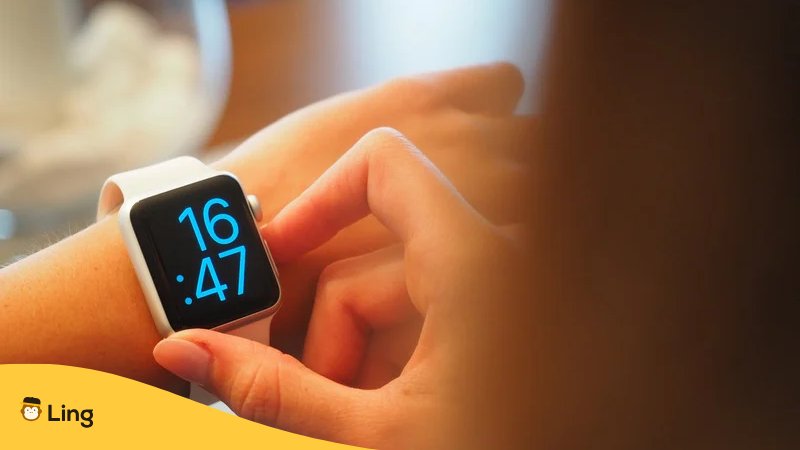If you are wondering how to speak like a local and have great ice-breaking topics to discuss with native speakers, try to involve yourself in their culture first. Basically, the culture in Urdu-speaking countries, like Pakistan, is particular in many aspects, such as in clothing with its unique and diverse looks. In addition, among locals, great conversation starters can be about sports, especially cricket, which is the most popular in those regions.
And of course, talking about the time will always be one of the most essential conversations you can have while visiting other countries. However, telling the time in Urdu is quite a tricky one. So keep reading to become a master of it!
Referencing The Times Of The Day
To tell and ask the time in Urdu, you must be able to reference the times of the day correctly. Here is a list of the basics:
| Time Of Day In English | Time Of Day In Urdu (Transliterated) | Time Of Day In Urdu (Arabic) |
| Morning | صبح | Subah |
| Noon | قبل دوپہر | Qabal Dopeher |
| Afternoon | دوپہر | Dopeher |
| Evening | شام | Shaam |
| Night | رات | Raat |
| Midnight | آدھی رات | Adhiraat |
| Early Morning | صبح سویرے | Subah Saverey |
| AM | صبح/دوپہر | Subah/Dopeher |
| PM | رات/شام | Shaam/Raat |
| O’clock | بجے | Baajey |
Times Of The Day
Referring to AM (before noon) can be only Subah. PM can be afternoon, evening, or night – that is, Dopeher, Shaam or Raat. Therefore, it is important to mention the time in reference to early or later in the day.
- Dopeher would be from 12:00 – 4:00 PM
- Shaam would be 4:00 – 8:00 PM
- 8:00 PM onwards is known as Raat
Although the Urdu translation for AM and PM in reference to the 12-hour clock can get a little bit tough, the Urdu language does not literally translate these. Rather the references mentioned above are more appropriate in spoken Urdu.
Time References In Urdu
Here are some handy time references in Urdu.
| Time Reference (English) | Time Reference In Urdu (Arabic) | Time Reference In Urdu (Transliterated) |
| Hour | گھنٹہ | Ghanta |
| Minute | منٹ | Minute |
| Second | سیکنڈ | Second |
| Time | وقت | Waqt |
| Half past | ساڑھے | Saarey |
| Quarter past | سوا | Saawa |
How To Tell The Time In Urdu Correctly
Constructing a grammatically correct statement is a must. The correct and accurate way of telling time in Urdu in a sentence is to follow the SOV sequence to make complete sense. This would be the subject first, then the object, and then the verb. Commonly SVO is used. And this may be why Urdu translation may be a little complicated.
You may consider your sentences age-appropriate if relevant. For example, the word aap is used for “you” for those who are older. But for younger people, the word tum is sufficient. In comparison to Hindi language, Urdu is sometimes more formal, and you may find people often use aap for those who are younger and older in age.
Urdu phrases such as almost or about midnight takriban raat barabaje or takriban adhiraat ko are also often used. Other time related sentences would be raat sawa gyara baajey for 11:00PM; subah sarey nou baajey for 9:30AM.
Telling The Time In Urdu
The following chart shows typical usage of sentences in Urdu which relate to asking the time in different ways in any event. These sentences are used in asking time daily. Some of the familiar examples are given below in Urdu
- وقت کیا ہواہے؟ (Waqt Kiya hova hai?) –What is the time?
- آپکی گھڑی پر کیا وقت ہوا ہے؟ (Aapki ghari per kia waqt hova hai?) -What time is it on your watch?
Before moving further, here is an additional pattern of Urdu words used in telling or asking time
| English Words | Urdu translation | Romanized Urdu |
| One second | ایک سیکنڈ | Ek second |
| One hour | ایک گھنٹہ | Ek Ghanta |
| One minute | ایک منٹ | Ek mint |
| One day | ایک دن | Ek din |
| One month | ایک مہینہ | Ek maheena |
| One year | ایک سال | Ek saal |
Hour
The word hour translates to (ghanta) in the Urdu language. As you know there are twelve numbers on the clock and without knowing their names in Urdu you will not be able to learn how to ask or tell time. If you are in the transport sector of Pakistan, then you must be aware of this word.
For learning time you should be familiar with the twelve-hour concept of am and pm.
In the Urdu language, the word se pehar (سہ پہر) is used for noon, subah(صبح) for the morning, and sham (شام) for the evening. They relate to the letters or patterns of a.m and p.m in Urdu or the day period times.
For the term o’clock the word (bajy) is used. To understand this concept, one should practice this format with the numbers of Urdu like this:
- ایک بجے (Ek bajy) -One o’clock
- دو بجے (Dou bajy) -Two o’clock
Some other examples of these words are:
فٹبال میچ اس اتوار دس بجے کھیلا جائے گا ۔ (Football match is itwar das bajy khaila jayega) -This Sunday, a football match will be played at 10 o’clock in the morning.

Minutes
The next important element in telling time is the minute which is termed the same (منٹ) in Urdu. As we use these minutes as time references for accuracy, similarly in Urdu you have to be proficient in this. They are a little bit tricky and difficult but practice will make it easy for you. Here are some examples which will help you in understanding:
- ایک بج کر اٹھایس منٹ ۔ (Aik baj kar athaees minute.) –One thirty-eight.
- اس جمعہ کو دس بجے کر پچاس منٹ پر میٹنگ شروع ہوگی۔ (Is jumma ko das bajy kar pacha’s mint par meeting shuru hogi.) –The meeting will start at 10:50 this Friday
Concept Of Seconds
The word second is pronounced the same in Urdu (سیکنڈ) so it’s not that difficult to understand this:
- کچھ ہی سکعنڈ میں کلاس شروع ہو جائے گی ۔ (Kuch hi second mai class shuru hojayegi) -Class will be started soon in a few seconds.
Writing Time In Urdu
Some of the examples are given below which are used in reference to time and other Urdu phrases used in day period times:
- صبح ( subah) -Morning
- دوپہر (dopehar) -Noon
- سہ پہر (seeh pehar) -Afternoon
- شام (Shaam) -Evening
- رات (Raat) -Night
- صبح سویرے (subahsawery) -Early Morning
- آدھی رات (adhi Raat) -Midnight
Examples Of Time In Urdu
Here are basic words and phrases in Urdu about how to tell the time in Urdu:
| English Words | Urdu Words | Romanized Urdu |
| It’s one O’clock | ایک بج رہا ہے۔ | Aik baj Raha hai |
| It’s two O’clock | دو بج رہے ہیں | Dou baj rahy hn |
| It’s three O’clock | تین بج گئے ہیں | Teen baj gaye hn |
| It’s four O’clock | چار بج رہے ہیں۔ | Char baj rahy hn |
| It’s five O’clock | اس وقت پانچ بجے ہیں | Is waqt panch bajy hn |
| It’s six O’clock | چھ بج رہے ہیں۔ | Chae baj rahy hn |
| It’s seven O’clock | سات بج رہے ہیں۔ | Saat baj rahy hn |
| It’s eight O’clock | آٹھ بج رہے ہیں۔ | Aath bajy rahy hn |
| It’s nine O’clock | نو بجے ہیں | No bajy hn |
| It’s ten O’clock | یہ دس بجے ہیں | Yai das bajy hn |
| It’s eleven O’clock | گیارہ بج رہے ہیں۔ | Ghiyara baj rahy hn |
| It’s twelve O’clock | بارہ بج رہے ہیں۔ | Bara baj rahy hn |
More Examples
Here are some examples of how the time is said with AM first and then PM later. Just take note that for 9 o/clock – AM you will need to use Subah nou baajey and Raat nou baajey for PM.
| Examples Of Time (English) | Examples Of Time In Urdu (Transliterated) | Examples Of Time In Urdu (Arabic) |
| Nine o’clock | صبح/رات 9 بجے | Subah/Raat nou baajey |
| Ten o’clock | صبح/رات 10 بجے | Subah/Raat daas baajey |
| Eleven o’clock | صبح/رات 11 بجے | Subah/Raat gyara baajey |
| Twelve o’clock | وپہر/رات 12 بجے | Dopeher/Raat bara baajey |
| One o’clock | صبح / دوپہر 1 بجے | Subah/Dopeher ek baajey |
| Two o’clock | صبح / دوپہر 2 بجے | Subah/Dopeher dou baajey |
| Three o’clock | صبح / دوپہر 3 بجے | Subah/Dopeher teen baajey |
| Four o’clock | صبح / دوپہر 4 بجے | Subah/Dopeher char baajey |
| Five o’clock | صبح/شام 5 بجے | Subah/Shaam paach baajey |
| Six o’clock | صبح/شام 6 بجے | Subah/Shaam chey baajey |
| Seven o’clock | صبح/شام 7 بجے | Subah/Shaam saat baajey |
| Eight o’clock | صبح/رات 8 بجے | Subah/Raat aat baajey |
Does Urdu Use The 24 hours Clock?
Depending on your settings, many prefer to use the 24-hour clock, while others prefer the 12-hour clock. In the Urdu language, the 24-hour clock is not generally used. For example, people do not usually say: see you at 08:00HRS (Oh Eight Hundred hours). Rather it would be said in the same way as given above – Subah Aat bajey milte hai.

Learning The Urdu Language With Ling
Your Urdu learning experience can be improved depending on the resources that you will use. Enhance the quality of your learning with Ling, a gamified Language learning app that can exponentially support and entertain your Urdu language learning!
Ling has numerous resources, making it your perfect language learning companion to understand, speak, read and write Urdu. Things you search for on YouTube may not always have a structured lesson ready to grasp. With Ling, you are assured of complete immersion in the culture, a selection of vocabulary is available, and with quizzes, challenges, and games, the correct pronunciation is guaranteed. So, tailor the experience of your Urdu Language learning and learn at your own pace with Ling!
Finally, a word of caution! To avoid awkward situations in Urdu-speaking communities’ sensitive and conservative culture, visit our blog post on 20+ Easy Disaster Vocabulary In Urdu To Learn Now. Write and comment about your Urdu Language learning needs in the comments section!
Download the Ling App using Play Store or App Store to develop and improve new skills in Urdu.



































































